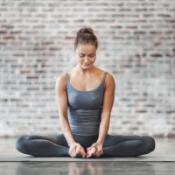 If you have anxiety, your doctor may have prescribed medication. Medication can help many people, and maybe it worked for you. But maybe it didn’t help. Or maybe you’d just rather try to manage your anxiety without drugs.
If you have anxiety, your doctor may have prescribed medication. Medication can help many people, and maybe it worked for you. But maybe it didn’t help. Or maybe you’d just rather try to manage your anxiety without drugs.
If that’s your goal, you may have begun looking for alternative, natural strategies to manage anxiety and stress. There’s no one-size-fits-all solution. What works for another person might not work for you. What will work for you is likely to depend on the type of person you are and what approaches best fit into your life.
Anxiety increases arousal levels in the brain and the body. So whatever steps you take to address it, it’s important to include strategies for mind and body awareness, good nutrition, and relaxation exercises in your plan. And of course, the importance of therapy can’t be understated.
The following suggestions can help you get started.
1. Manage your caffeine consumption.
Anxiety naturally heightens your arousal. So does caffeine. You know that boost of energy or wakefulness you feel after drinking a Red Bull or cup of coffee? If you’re already anxious, caffeine can make you feel even more anxious. It can also keep you up at night. Limiting caffeine intake, and cutting off caffeine six hours before bed, can also help.
Coffee’s not the only culprit. You might also want to pay attention to other ways caffeine might be sneaking into your diet. Candy bars, chocolate, protein bars, energy drinks, some specialty water, chocolate or coffee-flavored ice cream, soda, decaffeinated coffee and hot chocolate all contain some caffeine.
2. Get enough sleep.
Everyone is different, but most people should try to get seven to nine hours of sleep each night. I know I need a good eight hours of sleep to feel well rested. If you’re in the habit of staying up late and getting up early, you’re probably not getting enough sleep. When you don’t get enough sleep, your body and brain don’t get the downtime they need to recharge and reset.
3. Consider your diet.
Recent research shows a connection between the gut and the brain. You might wonder what that means for you. It means that an unhappy digestive system can make you feel bad emotionally. A balanced diet that includes yogurt, kefir, kombucha, pickles, and other foods containing probiotics can improve mental health, leave you feeling less anxious, and improve your digestive health as well!
4. Limit social media. If you feel anxious and stressed when you can’t check your Facebook, Twitter, Instagram, Snapchat or other social media accounts, you might want to consider taking some time away from them. Slowly reducing the amount of time you spend looking at your phone, tablet, or computer each day can help you work with your anxiety in manageable doses. If you want to cut back, it might be helpful to use an app that tracks how much time you spend on your device.
5. Practice yoga, tai chi, Authentic Movement therapy, or qigong.
Any of these practices can allow you to tune into your body with movement and mindfulness. By being more aware of your body’s sensations and signals, you can become better able to recognize anxiety when it starts to bubble up. As you become more tuned in to your body, you can attend to the anxiety before it gets overwhelming.
6. Exercise regularly.
Exercising releases endorphins, adrenaline, and other “good” chemicals and hormones in the body. It also helps relieve stress. But like meditation, exercise is not a once-and-done activity. To see the most benefit, it’s important to exercise regularly. If you haven’t exercised in a long time, or ever, start by doing a little each day. By slowly increasing the amount of time you spend exercising, you will begin to build stamina and strength.
7. Practice belly breathing or other deep breath exercises.
Deep breathing and belly breathing stimulate the vagus nerve, which runs from the top of the spine to the stomach. Stimulating the vagus nerve activates the part of the nervous system that helps the body calm down. Stimulating this nerve has been shown to help reduce anxiety that resists other types of treatment.
The amazing thing is that you don’t have to go to a doctor’s office to stimulate the vagus nerve. You can do it all by yourself through deep breathing exercises.
8. Practice mindful meditation.
Mindful meditation has been shown to help reduce anxiety and depression. You can find mindful meditation apps for your phone. YouTube videos and other online resources can also be helpful when you first start meditating.
Many people think the object of meditation is to clear the mind of all thoughts. That’s not the case. During guided mindfulness meditations, you pay attention to an “anchor,” such as your breath, natural sounds, or a mantra. Each time you are carried away by a thought, you bring your attention back to the anchor. It’s natural to have these thoughts, but each time you bring your attention back to your breath, you’re mindfully meditating!
People who experience a high level of anxiety may find meditation very difficult at first, but don’t give up. With practice, anyone can learn to meditate.
9. Work with a therapist.
Therapy can help reduce anxious feelings. Counseling provides a safe, non-judgmental place to talk about what’s on your mind. When searching for a therapist, it’s essential to find one who’s a good fit for you. If you don’t “click” with a therapist, it may be difficult to feel comfortable and relaxed enough to share what’s on your mind.
You don’t have to try all of the ideas listed above to begin making a difference in managing your anxiety. The most important thing is to get started. To begin, choose a few that feel comfortable to you and give them some time. Before you know it, you might be feeling less anxious!
References:
- Bamber, M. D, & Schneider, J. K. (2016). Mindfulness-based meditation to decrease stress and anxiety in college students: A narrative synthesis of the research. Educational Research Review, 18, 1-32. Retrieved from https://www.sciencedirect.com/science/article/pii/S1747938X15000676?via%3Dihub
- George, M. S., Ward, H. E., Ninan, P. T., Pollack, M. Nahas, Z., Anderson, B., … & Ballenger, J. C. (2008). A pilot study of vagus nerve stimulation (VNS) for treatment-resistant anxiety disorders. Brain Stimulation: Basic, Translational, and Clinical Research in Neuromodulation, 1(2), 112 – 121. Retrieved from https://www.brainstimjrnl.com/article/S1935-861X(08)00003-X/fulltext
- Javnbakht, M., Kenari, R. H., Ghasemi, M. (2009). Effects of yoga on depression and anxiety of women. Complementary Theories in Clinical Practice, 15(2), 102-104. Retrieved from https://www.sciencedirect.com/science/article/pii/S1744388109000048?via%3Dihub
- Messaoudi, M., Violle, N., Bisson, J., Desor, D., Javelot, H., & Rougeot, C. (2011, July 1). Beneficial psychological effects of a probiotic formulation (Lactobacillus helveticus R0052 and Bifidobacterium longum R0175) in healthy human volunteers. Gut Microbes, 2(4), 256-261. Retrieved from https://www.tandfonline.com/doi/abs/10.4161/gmic.2.4.16108
- Roy-Byrne, P. (2018, May 31). What medications are used to treat anxiety disorders? Anxiety and Depression Association of America. Retrieved from https://adaa.org/learn-from-us/from-the-experts/blog-posts/what-medications-are-used-treat-anxiety-disorders#%20May%2031,%202018
- Sawah, M. A., Ruffin, N., Rimawi, M., Concerto, C., Aguglia, E., Chusid, E., … & Battaglia, F. (2015). Perceived stress and coffee and energy drink consumption predict poor sleep quality in podiatric medical students. Journal of the American Podiatric Medical Association. 105(5), 429-434. Retrieved from http://www.japmaonline.org/doi/10.7547/14-082?code=pmas-site
© Copyright 2018 GoodTherapy.org. All rights reserved. Permission to publish granted by Elizabeth Cush, LCPC, GoodTherapy.org Topic Expert
The preceding article was solely written by the author named above. Any views and opinions expressed are not necessarily shared by GoodTherapy.org. Questions or concerns about the preceding article can be directed to the author or posted as a comment below.

 The Mind-Body Connection: How Mental and Physical Wellness Are Linked
The Mind-Body Connection: How Mental and Physical Wellness Are Linked Fermented Foods May Ease Social Anxiety in Young Adults
Fermented Foods May Ease Social Anxiety in Young Adults CARE: A Simple System for Dealing with Anxiety and Stress
CARE: A Simple System for Dealing with Anxiety and Stress